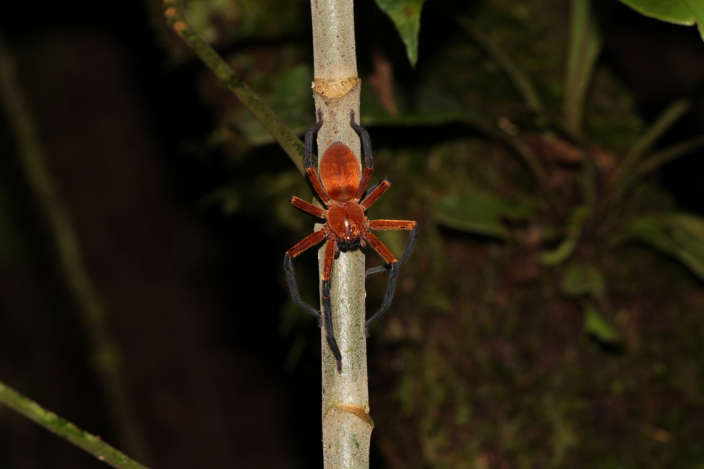While surveying the Amazon rainforest in Ecuador, scientists stumbled upon an orange creature with eight legs and fangs.
The creature is kind of Giant crab spideris a new species and the first of its genus to be found in the country, according to a study published July 6 in the journal Ecology and Evolution.
Scientists affiliated with the University of San Francisco in Quito found the novel spider in the Yasuni Biosphere Reserve, a protected area of rainforest in the northeast corner of the country. It is considered one of the most biologically diverse regions in the world.
While walking on a trail at night, scientists discovered several orange spiders “floating” on leaves and twigs above the forest floor.

“Samples were collected manually, transported to the laboratory in plastic containers with leaf waste, photographed live, and euthanized,” the researchers said.
The samples, which were all female, were then placed in an ethanol solution for further analysis under a stereomicroscope.
Then it was determined that the newly discovered spider belonged to the genus Sadala Simon, which consists of about a dozen spiders distributed throughout Latin America.
The spiders are known as crab spiders position they take while perched on plants, according to a press release from the National Institute of Biological Diversity in Ecuador. They stand with their legs spread out to their sides like crabs.
The new spider is no more than an inch long and is distinguished from others in the genus by slight differences in its body shape.
The spider, called Sadala rauli, is a nocturnal hunter, stalking insects several feet above the forest floor, according to the National Institute of Biological Diversity. Unlike many other spiders, it does not spin webs to catch prey.
The range of Sadala rauli is not well known because it has only been spotted in the Yasuni Biosphere Reserve, scientists said, noting that more research is needed.
By regulating insect populations, spiders play an important role in ecosystems. However, spiders have not been very studied in Ecuador, with only 1,000 species identified, a fraction of the numbers recorded in neighboring countries.
Google Translate was used to translate the press release from the National Institute of Biological Diversity.
PA cops said a Greyhound bus passenger plunged a knife into a rider’s neck in a fatal stabbing



